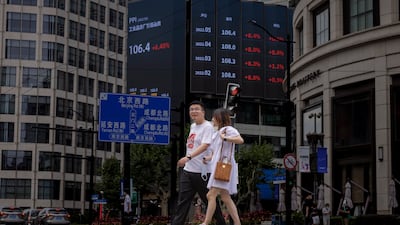Asian markets rose on Thursday after the US Federal Reserve cut interest rates by half a percentage point and signalled further cuts in the coming months.
Tokyo’s Nikkei 225 index settled 2.13 per cent higher at 37,155.33, while Hong Kong’s Hang Seng closed up 2 per cent to reach 18,013.16.
The Shanghai Composite index climbed 0.69 per cent to 2,736.02 and Taiwan's Taiex ended the day 1.7 per cent higher. The Korea Composite Stock Price Index recorded a marginal gain of 0.21 per cent.
On Wednesday, the Fed lowered interest rates by 50 basis points, initiating its first rate-cutting cycle in four years to protect the labour market as inflation slows.
Following this decision, the Federal Open Market Committee (FOMC) reduced the benchmark lending rate to 4.75-5.00 per cent from 5.25-5.50 per cent.
A 50-basis point cut is seen as a more urgent manoeuvre – as opposed to a more traditional 25 basis points – because it could suggest the Fed is concerned about economic growth.
“The choice to reduce rates by 50 basis points shows the FOMC is taking an aggressive approach to stimulating growth and propping up the jobs market,” said Mahmoud Alkudsi, senior market analyst at ADSS.
“While interest rate cuts were largely priced in by markets, cuts of this extent come as somewhat of a surprise,” Mr Alkudsi added.
US stock markets closed with modest losses on Wednesday, retreating from their intraday highs. The Nasdaq and S&P 500 both fell by 0.3 per cent, while the Dow Jones slipped 0.2 per cent.
Most central banks in the Gulf region cut their benchmark interest rates on Thursday, joining the US central bank in reducing the rate for the first time since 2020.
Saudi Arabia's benchmark index (TASI) gained 0.55 per cent, while Dubai's main share index (DFMGI) was up 0.69 per cent. Abu Dhabi’s main index (FADGI) was up 0.01 per cent.
Oil prices edged higher on Thursday after declining earlier in the day, as traders weighed the impact of lower interest rates on crude demand.
Brent, the benchmark for two thirds of the world’s oil, was trading 1.06 per cent higher at $74.46 a barrel at 1.11pm UAE time. West Texas Intermediate, the gauge that tracks US crude, was up 0.94 per cent at $71.58 a barrel.
“In emerging markets, [the rate cut] will go to create more oil and gas demand, but I'm not sure that's true in places like the US and Europe,” said Bora Bariman, managing partner at Hormuz Straits Partnership.
“Furthermore, then you have cheaper money in the hands of hedge funds that can short oil and have a lower cost of borrowing for their margin calls when they get it wrong … so, it goes both ways,” Mr Bariman said during a Gulf Intelligence podcast.
Last week, the International Energy Agency slashed its 2024 oil demand growth forecast, citing a “rapidly slowing” Chinese economy. Global oil demand growth is now expected to expand by 900,000 barrels per day this year, 70,000 bpd less than its previous estimate, the IEA said in its monthly oil market report.
China's post-Covid economic boom was short-lived, as property market woes, weak consumer spending and manufacturing slowdown hampered its recovery.
The Asian country consumed 13.9 million bpd of crude in August, a slight increase over the previous month but still down by 6 per cent year-on-year on an apparent demand basis, according to the National Bureau of Statistics.
The August numbers represented five consecutive months of declining year-over-year oil demand and a drop of almost 1.7 million bpd from a post-pandemic peak of 15.5 million bpd in February, Emirates NBD said in a research note published on Monday.
“China’s industrial demand data have consistently disappointed markets and it is unclear what scale of support the government is prepared to use to help turn the near-term trajectory for China’s economy around,” the Dubai-based lender said.

